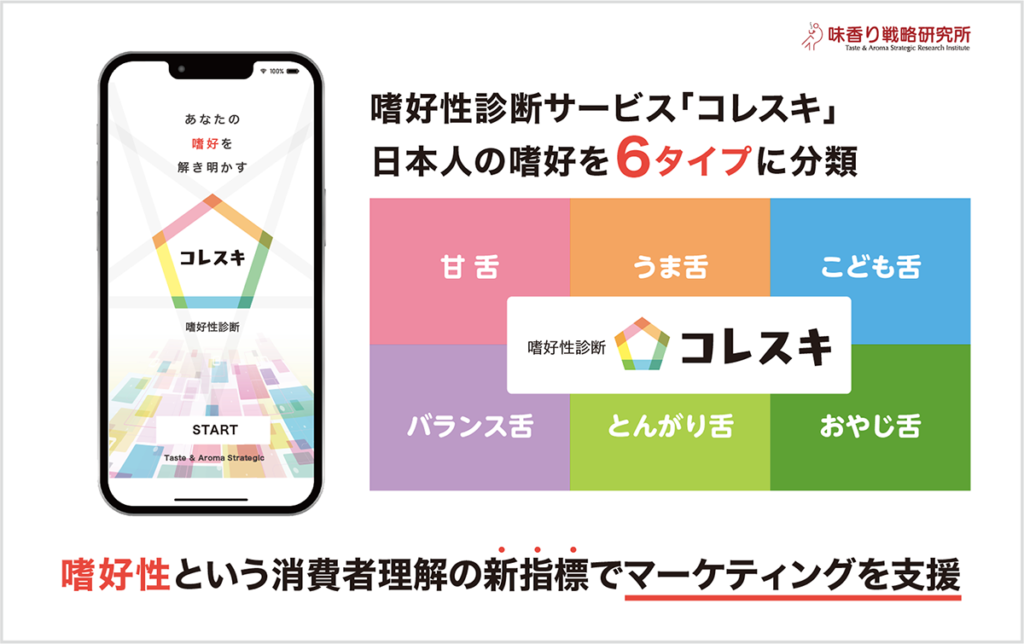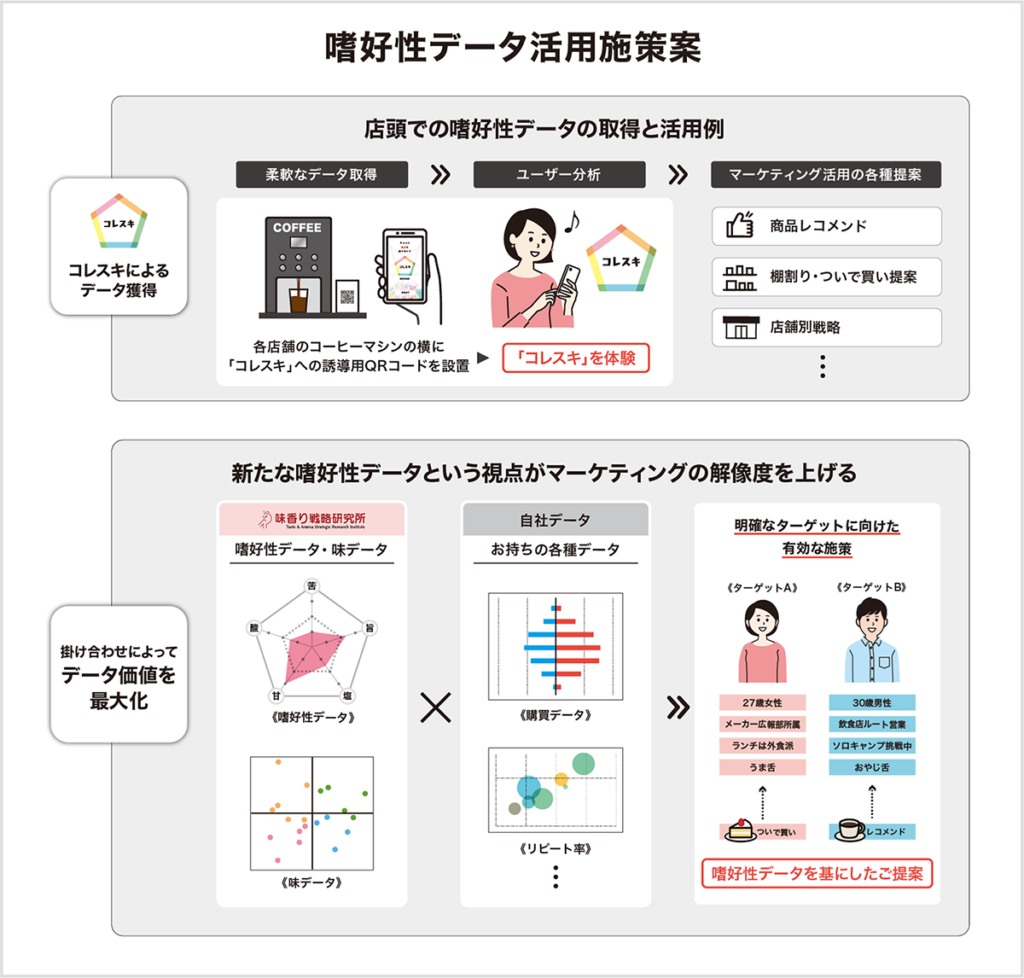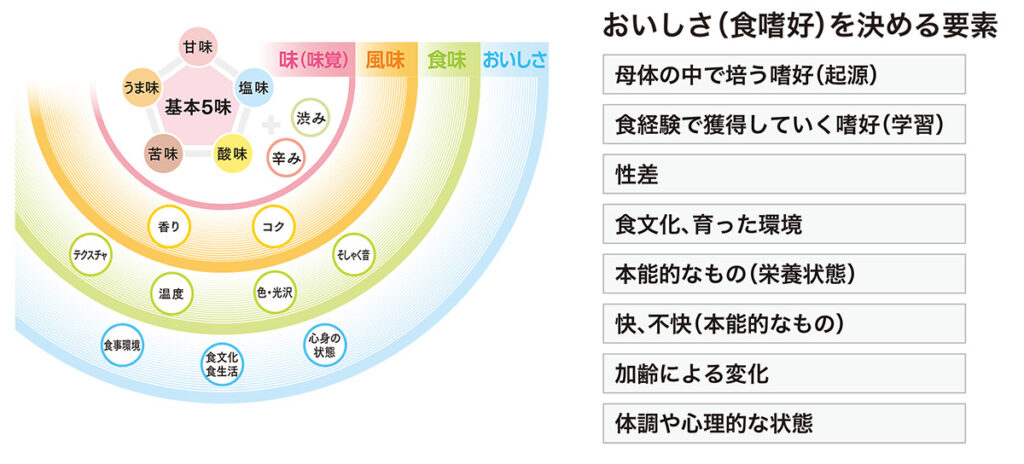Taste & Aroma Strategic Research Institute Co., Ltd. (Headquarters: Chuo-ku, Tokyo; President: Michihiro Koyanagi; hereinafter referred to as “Taste & Aroma Strategic Research Institute”) will start offering a new service called “CORESUKI” from Thursday, July 13, 2023, utilizing a proprietary likability diagnostic system developed from a database of over 120,000 taste profiles. With “CORESUKI” we have achieved easy data collection using smartphones to understand individual taste preferences, providing a new indicator of consumer understanding called “likability data.” This service will support the food industry in various scenes such as marketing, product development, and store strategy, enabling new challenges in the food industry.

“CORESUKI” is a new service that allows for easier and more enjoyable preference diagnostics. With “COLESKY,” users can diagnose their preference types instantly by answering just 15 questions, making it easy for the general consumer to understand their preferences. “COLESKY” is customizable, allowing for the setting of the offering period and adjustment of content to suit the purpose, and it can also be used for campaign deployment. Furthermore, it can be accessed simply by visiting a URL, making it available for implementation at various touchpoints such as QR codes, LINE for members, store apps, and in-store fixtures.
Examples of usage of “CORESUKI”

QR codes can be placed on self-service coffee machines in convenience stores and other locations. Consumers can use their smartphones to answer the “CORESUKI” questions while waiting, and the diagnostic result screen can also provide recommended information on store products based on their preference type, leading to impulse purchases. The data obtained from “CORESUKI” can be accumulated and used for marketing, product development, and store operations, providing more realistic consumer preferences related to taste. “CORESUKI” can also collect data based on conditions, such as separating data by store, allowing for flexible data collection.
Preference data can be treated similarly to traditional demographic and purchasing data in marketing, offering a new perspective to deepen consumer understanding and increase the resolution of the target audience for companies. Furthermore, by combining proprietary data from Flavor & Fragrance Strategy Research Institute such as preference and taste data with various data held by companies, we can maximize the value of this data and propose marketing strategies based on data analysis.
Preference data can be treated similarly to traditional demographic and purchasing data in marketing, offering a new perspective to deepen consumer understanding and increase the resolution of the target audience for companies. Furthermore, by combining proprietary data from Flavor & Fragrance Strategy Research Institute such as preference and taste data with various data held by companies, we can maximize the value of this data and propose marketing strategies based on data analysis.
Future outlook
The new service “CORESUKI” does not require specialized knowledge or equipment, and can be started by simply accessing the URL, lowering the participation barrier for general consumers’ taste preference diagnosis and accelerating the collection of more extensive and real-time data. Furthermore, we will continue to conduct large-scale surveys and analyses on taste preferences, and work on building the next taste preference diagnosis logic that incorporates aroma and texture, while maintaining the freshness of the current taste preference data. We will continue to develop and make use of taste preference data to the fullest extent possible.

The taste preference diagnosis technology developed by the Taste & Aroma Strategic Research Institute enables the development of personalized foods that cater to individual “deliciousness,” food recommendation services, the construction of a database of Japanese food preferences, and even the prediction of flavors that will be favored in the near future. The institute believes that taste preference data will become essential in the field of marketing and product development for companies in the future, and will promote the utilization of taste preference data by enlightening and further developing the data infrastructure, thereby supporting various challenges in the food industry.

Since its establishment in 2004, the Taste & Aroma Strategic Research Institute has been working on quantifying and visualizing the elements of taste, aroma, and texture, which are components of “deliciousness.” The concept of “deliciousness” in food is determined by various factors and is subjectively judged by individuals, making it difficult to scientifically assess. However, the institute has been able to scientifically demonstrate individual taste preferences, which are personal “deliciousness,” by establishing its own questionnaire program and taste preference diagnosis logic based on a database of over 120,000 taste profiles. This taste preference diagnosis technology is currently pending patent application.
Taste & Aroma Strategic Research Institute conducted a new survey on taste preferences, involving over 7,500 people nationwide, as part of its development of taste preference diagnosis. Through the analysis of the survey results, the institute was able to calculate the national average taste preferences and identify differences in taste preferences based on region, gender, and age group. The institute will utilize these survey results as fundamental data for taste preference analysis.
【Survey Results Release】March 1, 2023 The Taste Preference Diagnosis Program*1 Reveals the Deliciousness of Different Regions! – Thorough Examination of Taste Preferences by Age Group and Region –
https://en.mikaku.jp/news/2023/2640/
About the Taste & Aroma Strategic Research Institute
Taste & Aroma Strategic Research Institute, a company that studies the science of food, utilizes visualization technology for the “deliciousness” of taste, aroma, texture, etc. This technology allows for the objectification of sensory values that were previously perceived through relative evaluation, enabling them to be used as evaluation criteria and scales. Since its establishment, the institute has continued to digitize food, and has built a taste database of over 120,000 food items. Based on this database, they provide food digital solution services that utilize data for various challenges related to food, such as food development, quality management, market research, and customization of taste for overseas markets.
Email sales@mikaku.jp
